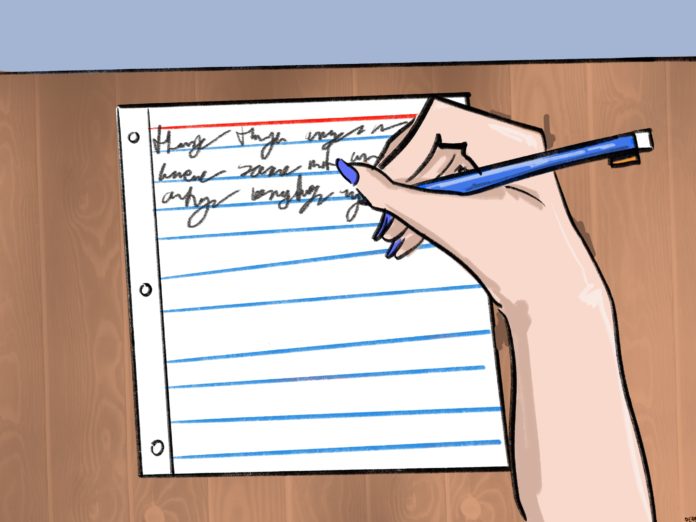By Caitlyn Meisner | Staff Writer
By offering writing sessions dedicated to publishing work and writing grants, the Women’s Faculty Writing Program (WFWP) has helped members achieve promotions and close the gap between male and female faculty positions at Baylor.
The program was first started in fall 2017 by two Baylor English professors. WFWP coordinator Dr. Lisa Shaver and Dr. Kara Poe Alexander attended a Texas Women in Higher Education Conference in summer 2017 and created the program not long afterward.
Shaver said Texas Tech University had a women’s faculty writing group of its own, and they got the inspiration from there.
“Later that summer, I saw a report about the number of women full professors at Baylor, which was at the time 18%,” Shaver said. “Across the academy, it was more like 32% and probably 26% for research-intensive universities. We thought that was unacceptable.”
Shaver said there are several ranks of professors, including lecturers, assistant professors, associate professors and full professors. She also said there is a difference between tenure-track and tenured faculty.
Lecturers teach more classes and have fewer research requirements. Assistant professors are typically those who recently graduated with a Ph.D. and are on the tenure-track. Associate professors are those who have gained tenure after five years of work. Then, there are full professors, who have reached the highest rank at Baylor.
Shaver said at each level of professorship, the percentage of women decreases. This is when she decided to take action, she said.
“Since one of the main drivers of you getting promoted is doing research, getting grants and writing, I put together this idea: Could a women’s faculty writing program help more women move toward promotion?” Shaver said.
Shaver also said women are often responsible for a plethora of things outside their academic work.
“Typically, they are the major caregivers, and they do most of the domestic chores — laundry, grocery shopping, setting up calendars,” Shaver said. “When women go home, it’s hard for them to work in the evening or on the weekends. They give a lot of time, and generally they love it, but in the end it can slow [down their career].”
Shaver and Alexander piloted a program in fall 2017 at Baylor with 15 associate professors. They met once a week for three hours in the library, and the group only stopped writing for 15 minutes to check in with each other.
“The idea with the WFWP is to make writing a weekly priority,” Shaver said. “Participants block that time off on their calendar, [and] they leave their office so students can’t come see them. They don’t have emails or phones that ring.”
With a promotion from assistant to associate, Alexander said many professors gain administrative roles as well.
“Almost everyone that’s in the full professor group also is an administrator, whether they’re a chair, associate dean or a graduate program director,” Alexander said. “When you get an administrative job, it really does take away from writing time, and teaching does too.”
Members typically meet in Moody Memorial or Jones Libraries every week and book specific spaces for the program during the three-hour periods.
Currently, the program runs seven weekly groups that consist of two full professor groups, three associate professor groups and two tenure-track groups. There is also a satellite group in Dallas with the School of Nursing.
Shaver said they separate the groups based on rank because challenges faced by each group vary. For example, she said full professors might be department chairs, lead search committees and have service requirements, so it may be difficult for them to move their research forward.
“It would kind of be like a freshman and a senior,” Shaver said. “They’re just in different places. We really want them to be support for each other.”
Dr. Linda Olafsen, associate professor of electrical and computer engineering, said the WFWP was helpful for her when she was trying to publish articles or work on her patents.
“There aren’t always deadlines for submitting an article, so I’m able to say [with the program], ‘OK, I’m going to carve out this time, and this allows me to set a goal,'” Olafsen said. “Without deadlines, that’s hard because [with] kids, you go, ‘OK, I don’t have a deadline. My child is more important. My child needs me right now.'”
Alexander said she likes how the groups are based on rank rather than discipline. She said the type of writing differs across the disciplines; different people could be reading in preparation for writing, analyzing data, working on book manuscripts, crafting conference presentations or working on proposals for scientific grants.
“In departments, we kind of get siloed to where we’re only around people in our department or in our academic unit,” Alexander said. “This program facilitated friendships and networking across all disciplines and all colleges.”
Alexander also said she benefited greatly from the program when it first started. She said she was able to get promoted and now works as a facilitator for one of the groups.
“This program really helped me think about strategizing for that time that I would want to go up for full professor,” Alexander said. “I also think it just increased my scholarly productivity. When you are writing more, you’re publishing more, and that is one of the main metrics for full professor.”






